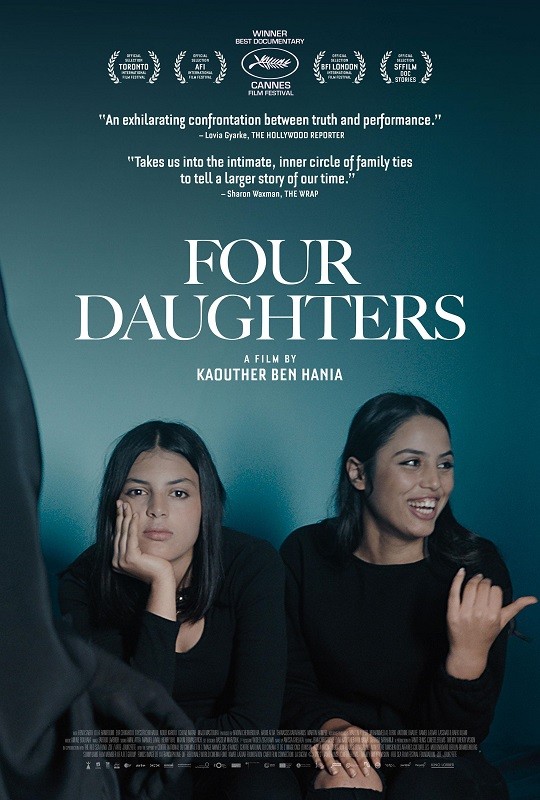Four Daughters
Introduction
With all the weekend releases covered, I did have some breathing space to explore and scout for content from across the globe. And I immediately revisited my Oscar list given that the Academy Award Season is warming up. With that, I finished watching the new film from Tunisia titled ‘Four Daughters’ which is Tunisia Official Submission to the Academy Awards this year(not nominated in the Final 5) and Nominated under the Top Documentary Films at the Academy Awards this year. One of my reasons for exploring content from different corners of the world is to understand the culture of the country where the drama is set in while also wishing to briefly be acquainted with the history of the country. And my love for culture made me wish to watch Four Daughters which is officially my first film from Tunisia that I have watched and now reviewing. Without having any inkling about what the film was about, I ventured into the film Four Daughters, does it manage to impress, let’s find out.
Story & Screenplay
Four Daughters documents the life of a family from Tunisia comprising of four daughters along with her mother, out of which two daughters are radicalized amidst the shifting politics of the land. The format of the story is such that it is a documentary while also re-enacting certain sequences in the lives of the daughters. This for me was a refreshing change from the standard documentary format that would generally have people talking and sharing their personal experiences in front of the camera. This was in many ways similar to the Moroccan Film The Mother Of All Lies which had the entire sequences represented through dolls. I do like how innovative filmmakers are in exploiting newer formats which are capable of disrupting the genre. The screenplay standing at about 110 minutes is deeply shattering and subtly disturbing given the family who is separated due to radicalization that potentially destroys their harmony owing to the shift in power in Tunisia.
The drama begins with the introduction of the key members of the family featuring the mother(Olfa) along with her two daughters Eya and Tayssir who are extremely emotional about the story that they would have to relive through the retelling of the documentary. To give them company, there are actors Nour Karoui, Ichraq Matar and Hend Sabry, two of whom would be enacting the roles of the two ‘missing’ daughters while the other would reprise the role of Olfa. You are briefly acquainted with the hardships that Olfa had to encounter in her growing up years in a society that was largely patriarchal. This made her even protective about her four daughters that she had conceived through her first marriage. The daughters on the other hand were free birds, often rebellious while being subjected to a lot of restrictions at their homes.
Whilst this was a personal tale of the family, we are briefly acquainted with the power tussle simmering in the land, firstly with the then dictator of the country who had put a ban on the Hijab owing to signs that it is used as a tool for rebellion. On the other hand, the shift in power saw the authorities brainwashing young girls into not only donning the attire but also radicalizing them, all in the name of religion. When the drama first began, there was a mystery surrounding the two daughters who were just not to be seen. Slowly but surely, you get a sense of the situation of the family which would have been so difficult in times when there were people influencing impressionable minds for their personal benefits. The screenplay is subtly moving and deeply disturbing particularly when you get to the final act wherein the family have moved on while having a lingering sense of hope of a possible reunion.
Dialogues, Music & Direction
The lines are the backbone of this film given that they emote a certain emotion of incompleteness and uncertainty, a theme that is layered throughout the narrative. The lines are often reflective of the political situation of Tunisia through the 2010s that helps you get a glimpse of the recent history of the country while staying connected through the conversations of the family. So it is important that you pay attention to the same, and allow the lines to grapple you during its narrative. Director Kaouther Ben Hania does a wonderful job in constructing the events of the film while keeping the mystery intact. At its core, the subject was extremely relevant yet emotional and hard-hitting and I was overwhelmed and in tears by the end of it!
My Take
By now we know(I hope), that terrorism has no religion but the reality is that people even today are swayed and radicalized in the name of religion. What this film does is give a glimpse of what an extreme step can do to a family which quite clearly had to bear the brunt of the decision of the daughters. As Karma would have it, one of the daughters had a child all of 5 months when she was arrested which meant that the little kid had to grow up in a jail. And that for me was such a disturbing and emotional sight, even as I was repeatedly questioning the fault of the poor child.
Secondly, patriarchy has unfortunately ruled the roosts for most parts of the world. But if someone were to dictate terms to you on what to wear and what not to wear just for the sake of politics then that for me is the downfall of the higher authorities. Given that the family here wasn’t in the best of financial conditions back in the day, the issue should really have been on raising the economic condition of Tunisia as opposed to playing politics over the attire.
Thirdly, I do feel that parents should try and not impose their beliefs on children. I totally did get the scenario here of the mother having to deal with her own issues of raising four children single handedly while being extremely protective towards them. This was also giving a little benefit of doubt to her lover while he wished to exploit the daughters too(in a s*xual manner). A little trust in children wouldn’t hurt even as it is imperative to keep a close eye on them. That said, no mother should be subjected to what Olfa went through regarding her children. This wss painful and shattering.
Conclusion
Tunisia’s Official Submission to the Academy Awards this year(not in the final top 5) and nominated under the ‘Best Documentary Film’ this year, Four Daughters is a deeply disturbing and moving documentary on radicalization and separation that makes for a subtly poignant watch. This drama is highly recommended from my end.




